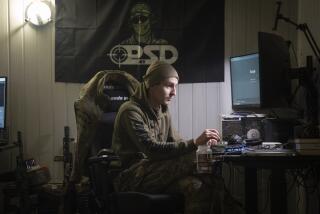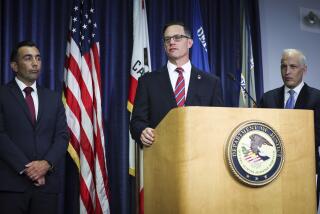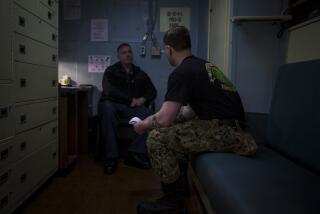In new Navy, sailors learn to button lips
ABOARD THE USS PELELIU — The old slogan “Loose Lips Sink Ships” flashed on television sets throughout this amphibious assault ship as it cruised the Arabian Sea this week. Sailors and Marines weren’t just warned to keep a lid on information -- they were reminded to watch their e-mail, too.
And if they had any doubts about the information they might be passing on to their families, the commodore of Amphibious Squadron One said he told them to follow a simple rule: Don’t write anything they wouldn’t want to see in a big-city newspaper.
“Our sailors and Marines have been very good in reacting to that,” said Navy Capt. William E. Jezierski.
E-mail is just part of the information explosion that officers must deal with as the U.S. military wages war. Satellite television brings 24-hour news aboard. A secure Internet connection carries messages day and night.
And, if the 15th Marine Expeditionary Unit is called to action, it can dispatch the elite Force Reconnaissance Platoon for on-the-ground intelligence.
“The hardest part is just the volume of information, being able to sort it, use it, act upon it,” Jezierski said.
Even the Force Reconnaissance Platoon, the eyes and ears of the Marines, has to deal with the information glut. These are the Marines who would likely hit the ground first in any fight, slipping into enemy territory to gather intelligence before the main attack.
“You have to be able to sort through what we believe is helpful,” said a staff sergeant and team leader who declined to give his name. “There is a lot of information out there, an overabundance of information.
“What poses a problem for us is to clearly identify the enemy,” he said. “In most cases through history it hasn’t been that difficult due to uniform insignia.” But in Afghanistan, opposing armies often carry similar weapons and, until recently, wore the same style of clothing.
While legwork is vital for the Force Reconnaissance Platoon on the ground, computers have become vital for Navy leaders at sea.
“It used to be you’d spend a lot of time up on the fly bridge ... watching things going on, working your way through combat and being very aware of what was happening locally, within the skin of the ship,” Jezierski said. “Now, the ability that you have at your desktop to reach out and touch people to be able to get the overall tactical picture, that capability is achievable. And also just the ability to work at your desk and gather information, be able to pass e-mails, is a tremendous step forward.”
When Jezierski was last deployed at sea, in the mid-1990s off Somalia, his ship did not have satellite television. This week, sailors and Marines sat down over breakfast to watch the seventh game of the World Series. At times, the grass appeared blue and the sound and picture froze, yet it was still live baseball, the Series at sea.
“There is so much information out there,” Jezierski said. “Five years ago we operated in an environment where we really had to pull information. Now, information is being pushed to us almost to the point where too much information is as bad as not enough.”
Sometimes, television does the best job of simplifying the story.
“CNN provides us some information that we may not have from normal channels, in that it takes that information, shows us some level of end result,” Jezierski said. “It does help to round out that overall picture. I would not characterize it as good or bad, but it is complementary to what we would get through military and national channels.”
Information is also a quality of life issue. The old days of waiting weeks for letters from loved ones, ferried to the ships via helicopters, have given way to near-instantaneous communications.
But Jezierski said the Sept. 11 terror attacks in New York and Washington created a “little different world” of information passed over unclassified systems.
“The general information we have told people is that we don’t want passed over unsecured means anything having to do with ship’s location, current and future tasks, current and future operations, general readiness, anything having to do with our general way of doing business on board ship,” Jezierski said.
And just in case anyone forgot the rules, an old-fashioned message continued to flash on television: “Loose Lips Sink Ships.”
More to Read
Sign up for Essential California
The most important California stories and recommendations in your inbox every morning.
You may occasionally receive promotional content from the Los Angeles Times.










